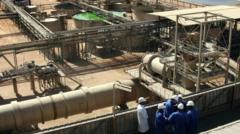**In a recent forum, President Putin's remarks about army dominance overshadowed economic efforts, revealing the Kremlin's anxiety over the country's tenuous economic situation.**
**Putin's Economic Forum Highlights Russia's Growing Anxiety Amid War Strain**

**Putin's Economic Forum Highlights Russia's Growing Anxiety Amid War Strain**
**Amid economic challenges, Russia's leaders voice concerns at the St. Petersburg International Economic Forum.**
At the St. Petersburg International Economic Forum, a peculiar encounter occurred when a Russian MP approached me with a provocative question: "Are you going to bomb Iran?" I responded firmly, "I'm not planning to bomb anyone!" The MP followed up, implying that the UK was at the helm of U.S. foreign policy, asserting, "He's told what to do by Britain," as he grinned before departing. This odd exchange highlighted a palpable tension at the forum, where the topic of the economy was often eclipsed by anxieties surrounding geopolitical conflicts.
President Vladimir Putin took to the stage on Friday for the keynote address, ostensibly focused on economic development. Yet during his subsequent panel discussion, he made a controversial statement: "We have an old rule – where the foot of a Russian soldier steps, that’s ours." This militaristic boast seemed contrary to an event aimed at attracting foreign investment and international collaboration.
Since the full-scale invasion of Ukraine in February 2022, the Kremlin's economic stability has appeared secondary to its war ambitions. Though Russia's economy experienced growth owing to increased military spending, recent signs indicate that such growth is waning. The Russian government's collective anxiety shimmered beneath Putin’s surface confidence, which he bolstered with the claim, "Rumours of my death are greatly exaggerated," in reference to the economy's trajectory.
Amid this climate, Economic Development Minister Maxim Reshetnikov highlighted the nation’s precarious standing, suggesting the economy is "on the brink of recession." Similarly, Central Bank Governor Elvira Nabiullina remarked on the exhaustion of previously activated economic resources and the need for a strategic reevaluation of Russia's economic policies.
Originally designed to showcase Russia’s economic potential, the forum’s allure had diminished, particularly due to the substantial international sanctions imposed in response to the Ukraine crisis. The withdrawal of many Western companies has left significant gaps in the Russian market, drawing mixed sentiments about potential future investments from abroad. Kirill Dmitriev, President Putin's envoy for foreign investments, noted the presence of U.S. investors willing to return, attributing this interest to evolving sentiments in Washington towards sanctions and business collaboration.
Nevertheless, high-ranking representatives from American businesses were clear: a resolution to the ongoing conflict in Ukraine would be vital before considering a significant return. American Chamber of Commerce President Robert Agee stated, “You have to have some sort of an end to the conflict before American companies are going to seriously consider going back,” acknowledging the hesitance firmly rooted in the current geopolitical landscape.
With inflation soaring, interest rates high, and reports of economic stagnation and potential recession, discussions of Russia's economic dilemmas have become increasingly candid. As leaders contemplate these daunting challenges, the timeline for recovery remains uncertain amidst the ongoing turmoil of war.





















